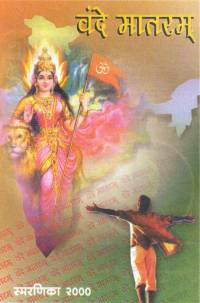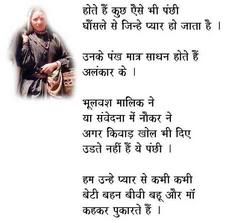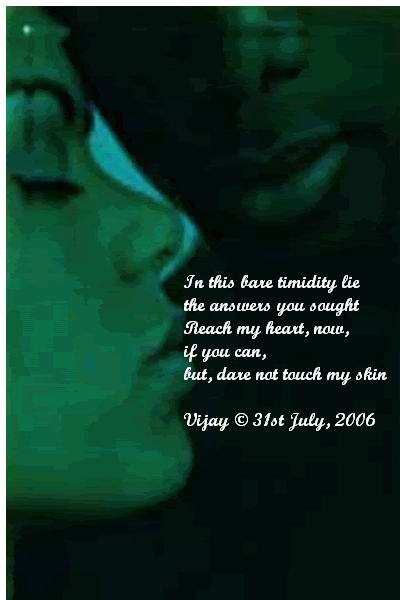
A recent happening, more clearly described the following news items has prompted me to pen down my thoughts here:
INDIAN EXPRESSand
TIMES OF INDIAThere should be more to this controversy than what meets the eye. Theologists and Fundamental Religious practitioners would always look at the basics and hard-etched rules that are being followed over the years. It is quite difficult for a handful of liberals to suddenly change the way centuries of belief paves the way for the fundamentals.
Having said that, here is the translation of Vande Mataram by Sri Aurobindo, which is considered as the most authentic translation to date:
Mother, I bow to thee!
Rich with thy hurrying streams,
bright with orchard gleams,
Cool with thy winds of delight,
Dark fields waving Mother of might,
Mother free.
Glory of moonlight dreams,
Over thy branches and lordly streams,
Clad in thy blossoming trees,
Mother, giver of ease
Laughing low and sweet!
Mother I kiss thy feet,
Speaker sweet and low!
Mother, to thee I bow.
Who hath said thou art weak in thy lands
When the sword flesh out in the seventy million hands
And seventy million voices roar
Thy dreadful name from shore to shore?
With many strengths who art mighty and stored,
To thee I call Mother and Lord!
Though who savest, arise and save!
To her I cry who ever her foeman drove
Back from plain and Sea
And shook herself free.
Thou art wisdom, thou art law,
Thou art heart, our soul, our breath
Though art love divine, the awe
In our hearts that conquers death.
Thine the strength that nervs the arm,
Thine the beauty, thine the charm.
Every image made divine
In our temples is but thine.
Thou art Durga, Lady and Queen,
With her hands that strike and her
swords of sheen,
Thou art Lakshmi lotus-throned,
And the Muse a hundred-toned,
Pure and perfect without peer,
Mother lend thine ear,
Rich with thy hurrying streams,
Bright with thy orchard gleems,
Dark of hue O candid-fair
In thy soul, with jewelled hair
And thy glorious smile divine,
Lovilest of all earthly lands,
Showering wealth from well-stored hands!
Mother, mother mine!
Mother sweet, I bow to thee,
Mother great and free!
Now check out the highlighted portions. While I am all for compassion towards other faiths, "compassion" should not mean that I would be made to display compassion forcibly. In my honest opinion, Muslims cannot be forced to sing Vande mataram.
Please check out one blog entry which may give you some more insight:
Vande mataram and Muslims Now, I bring you back to the emphasised words.
What do "Thou art Durga,
Lady and Queen," suggest? Should any of us Indians be singing this at all??
From the time Mohd. Ali was the President of Indian National Congress and had objected to this song being sung at its national conventions, this controversy has refised to die down.
Check out:
About Vande mataramMy whole point is, why should anybody be forced to sing anything? Even a national song? Patriotism and love for one's country cannot be imposed. It should come from within. There cannot be a benchmark for patriotism. We all do our little bits for the country in whatever way we can (Be it Hindus or Muslims or follower of any other faith). Singing or refusing to sing "a" particular song, accepted by the majority cannot make the minority non-patriotic.
Is Vande Mataram anti-Islamic?
No, Vande Mataram is not anti-islamic. It is non-islamic.
However, the case being canvassed by the Imams is that singing this song (which is akin to worshipping an idol or an entity other than Allah) is blasphemous. Let us not take this discussion on a tangent.
Today, Religion separates us and defines our territories. Whatever the Religion or the sacred texts might have postulated, today we look and percieve another's faith with intolerance. That is the root cause of even this controversy.
We cannot walk on the thin blade of secularism without wounding our feet. Be that as it may, secularism means freedom to practice one's own relegion. What the imams say is also what the majority follow today. Assuming that the Imam's intrepretation of the issue is faulty, the need for change should come from within the Islamic community. Till then, the non-muslims may have to bear with this.
The same theory would apply to the overt diktats of Hindu Fundamentalists. Who could stop them from vandalism and harassing couples on Valentine day? Who could stop them from calling for Muslim blood during riots? Even for those holding the flag of Christianity high, who stops missionaries from converting for money?
Hard questions.
These isolated incidents are merely there to incite egos and frenzy, everytime we find peace. Take it just as that.
I would sing Vande mataram to my heart's content because there is an adrenalin-rush everytime I sing it. I don't consider Rahim, my friend, as non-patriotic just because he doesn't sing it. I can still feel and see his angst and love for the country when the nation is in dire straits. Why should I bother him at all?
How many of us stand up in rapt attention today when the National Anthem plays. Ask your self honestly. Assume one does and one doesnt. Does that make one less patriotic than the other?
Now let me come to what "I" think:
We are driven by many forces. Like the cliched saying that "Pyaar se pait nahii bhartaa" ....waise hii....."Patriotism se bhi pait nahi bhartaa".
If I am a patriot, I dont have to shout from the rooftops or even let anyone know that I am. I have it inside me and I know that and that is what matters. Do you think that if Muslims are forcefully made to sing Vandemataram, they would turn patriots if they are not already? Do you think others who sing Vandemataram at the top of their voice are patriots?
In the times when espionage and deserters are growing in the ranks, dont you think that "imposition of forcible singing of Vande Mataram" is merely a useless issue to discuss??
Now look at something more interesting.
Article 28(3) of our Constitution states:
28. Freedom as to attendance at religious instruction or religious worship in certain educational institutions.—
(1) xxxxxxxx
(2) xxxxxxxxx
(3) No person attending any educational institution recognised by the State or receiving aid out of State funds shall be required to take part in any religious instruction that may be imparted in such institution or to attend any religious worship that may be conducted in such institution or in any premises attached thereto unless such person or, if such person is a minor, his guardian has given his consent thereto.
Very simple, unambiguous and straightforward, nothing more, nothing less.
No person in any educational institution State run or aided shall be required to take part in or to attend any religious worship that may be conducted in such institution unless such person or, if such person is a minor, his guardian has given his consent thereto.
Now, read Section 3 of the Prevention of Insults to National Honour Act, 1971
3. Prevention of singing of National Anthem:
Whoever intentionally prevents the singing of the Indian National Anthem or causes disturbances to any assembly engaged in such singing shall be punished with imprisonment for a term, which may extend to three years, or with fine, or with both.
These are the only provisions in laws related to what we are discussing here.
Vande mataram is a National song and not the National Anthem so as to be even touched by Section 3 of the Prevention of Insults to National Honour Act, 1971. There is no dispute as to the fact that Hindu deities are liberally mentioned in the song and that Islam per-se prohibits worship at temples and of idols and by implication, rendition of such a song. Those who interpret Islam have said that the song should not be sung. Who could now sit in judgment against the same?
If tomorrow, eating beef on a National day is made mandatory by the Government for Indians, would Hindus eat beef just to display patriotism?
Hypothetical, but nevertheless a question.
We must not forget that while Pakistan is an Islamic State, India is not a Hindu State. We have evolved over the years since independence. We have seen and experienced that the dreams of the visionaries who laid the foundation stone of the country were quite optimistic and various unforseen factors have kept such dreams and visions confined to books.
We have had umpteen amendments to the Constitution, which only goes to prove that we are open to changes as a Society, where the need so arises.
I believe that many of the decisions immediately post independence were taken in a haste and by a group of leaders who had all the say in the matter. The lesser connected Junta had no way of expressing their opinion. (Vande mataram as I said, was not a unanimous choice, having faced protest much prior to Independence).
The point I am bringing you to is, now that we have evolved as a debating and thinking nation, where at least an endeavour is made to gather and assimilate public opinion, we should also explore the option of looking at an alternative for Vande mataram, which every community would identify with and join the chorus when sung.
It may be too wishful a thought but it is not Utopian.
Either we change to accomodate all or we banish all. The latter is impossible and not adviced either. The only solution is change. We have to shed age-old inhibitions and beliefs, which are merely dead corpses now. It has to be done by all. Intolerance is rampant in all communities. It is because the moderates consider silence to be divine, that extermists and fundamentalists have a field day. Imagine when the silent majority of moderates stand up, where could the funadementalists be running for cover? Nowhere!!!







